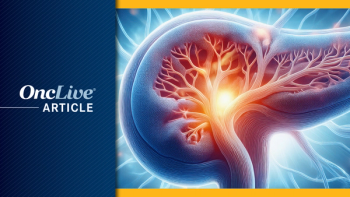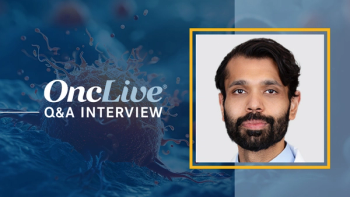
Novel and Combination Therapies for the Treatment of Gastric Cancer
Transcript:Johanna C. Bendell, MD: Who would have ever thought we’d talk about lines of therapy and sequencing of therapy for patients with gastric cancer? But you know, it’s interesting. Now that we’re looking at new agents—a lot of clinical trials are out there—and there is this sort of gestalt that tumors change over time, do you ever repeat a biopsy after the patient has gone through second-line therapy? For instance, before third line? David, do you?
David H. Ilson, MD, PhD: In the context of a trial. Outside a study, I think there’s limited value for doing this. I think this is why we incorporate biopsies into research trials, because we want to learn whether there is acquisition of new mutations and abnormalities. We want to have a more up-to-date characterization of the tumor. We do know from our database within Memorial Sloan Kettering Cancer Center, looking at trastuzumab-refractory patients, when we rebiopsy them, they acquire all these new mutations and they lose HER2 expression. But now with the advent of liquid biopsies, doing blood-based analyses needs to be explored to avoid the morbidity and invasiveness of a repeat biopsy.
We’re in an era where there’s a lot of active drug development. I think we’ve kind of hit a plateau with checkpoint inhibitors, and I think we really need to look at novel combinations. How can we make a cold immune environment hot? Are there ways we can augment checkpoint inhibitors? Are there novel immunosuppressive mechanisms that we haven’t even developed yet? Can we combine some of our existing agents—like PARP inhibitors, that may augment the immune microenvironment—and even drugs like ramucirumab and VEGF-targeted agents? Kohei, can you comment on your rather striking results with regorafenib, a tyrosine kinase inhibitor [TKI] targeting VEGF and checkpoint inhibitor therapy.
Kohei Shitara, MD: The trial is just a phase I trial. We reported results in this ASCO [American Society of Clinical Oncology] Annual Meeting, which includes 50 patients—25 with gastric cancer and 25 with colorectal cancer. Overall, we observed a 40% response rate. There was a 44% rate in gastric cancer and a 36% rate in colorectal cancer. From the safety point of view, initially this is a usual design, but we decided that 80 mg of regorafenib is the optimal dose because of the safety. And from the preclinical point of view, there were very interesting data which support this lower dose of regorafenib.
Our concept is to target immune cells such as regulatory T cells and the tumor-associated macrophage. If we used a higher dose of regorafenib, CD8 got reduced. So we still reduced the dose based on safety profile, but there were data to support the lower dose of regorafenib. Actually, the biopsy before and after treatment showed the clear reaction of regulatory T cells, which may be in line with our concept. Currently, we are discussing future steps.
David H. Ilson, MD, PhD: We already have phase II data for regorafenib in refractory gastric cancer that demonstrates it may have some disease-stabilizing effect but no responses. To actually see a response in a combination is a signal, and there is an ongoing randomized trial of regorafenib versus best supportive care in refractory gastric cancer. And another VEGF tyrosine kinase inhibitor, apatinib, has actually shown superiority in China. It’s actually approved in China as a late-line treatment option.
Manish A. Shah, MD: Yes. I think it highlights what we’re talking about. Immunotherapy has modest activity in gastric, esophageal cancer. It’s really 10% to 15%, even if you’re PD-L1 [programmed death-ligand 1]—positive. And we’re doing a lot of work. Kohei, your study is a fantastic example of that—to try to combine drugs to improve the efficacy of the immunotherapy.
Johanna C. Bendell, MD: We’re doing new combinations of immunotherapy. Kohei, you do a lot of phase I work outside VEGF inhibitors. What are you seeing now? What agents are in play for combination immunotherapy?
Kohei Shitara, MD: I do a similar trial, but the first concept is to target immunosuppressive cells like the previous regorafenib trials. Another trial I have conducted is a heat-shock protein 90 [HSP90] inhibitor.
I also have looked at a CD4 therapy, which targets all immunosuppressive cells. It showed single-agent activity. But these immunosuppressive cells may not be enough for all patients with gastric cancer, especially as mentioned before, for a cold type of tumor. These tumors usually have a low infiltration of CD8 as well as immune-suppressive cells. Maybe additional treatment to kick the immune system is important?
One of the candidates is an oncolytic virotherapy. We previously reported preliminary data in gastric cancer at a previous AACR [American Association for Cancer Research Annual] Meeting. It showed activity in the primary tumor as well as in distant metastases. The local tumor showed the infiltration. This is 1 candidate. And the other local therapy will be discussed in the future. I cannot disclose today. But the other local therapy in combination with immunotherapy—this trial will be started soon. And additional cell therapy, or CAR [chimeric antigen receptor] T-cell therapy, may become an additional breakthrough for patients with cold-type gastric cancer in the future.
Johanna C. Bendell, MD: Yeah, it is super exciting what’s happening with immunotherapies—the bispecifics, the CAR Ts, the combinations. It’s interesting. Then we go back and think about gastric cancer, and everybody always loves that age-old combination of a PD-1 [programmed cell death protein 1] inhibitor plus a CTLA4 inhibitor. David, nivolumab-ipilimumab, gastric cancer?
David H. Ilson, MD, PhD: The original comparative phase II study comes from 1 of my colleagues at Memorial Sloan Kettering Cancer Center, Dr Yelena Janjigian. The combination of ipilimumab-nivolumab was chosen as 1 of the randomized arms in up-front therapy because of a potential advantage in response rate. Even from the outset, the signal wasn’t that strong. There really wasn’t a clear difference in progression-free or overall survival for nivolumab alone versus ipilimumab plus nivolumab. And it’s a toxic combination. I know our melanoma doctors use it all the time, but that arm was actually dropped from the first-line randomized trial because of adverse events.
I think at the current time, the combination of CTLA4 and PD-1 is on the backburner. There are some alternatives. Tremelimumab as a CTLA4 drug is still being looked at in phase I and phase II trials. There are likely going to be better partners because it’s going to be hard to imagine adding something else to ipilimumab and nivolumab. And without a clear signal with adverse-event rates, it’s probably not going to be something that’s going to move forward.
Transcript Edited for Clarity



































